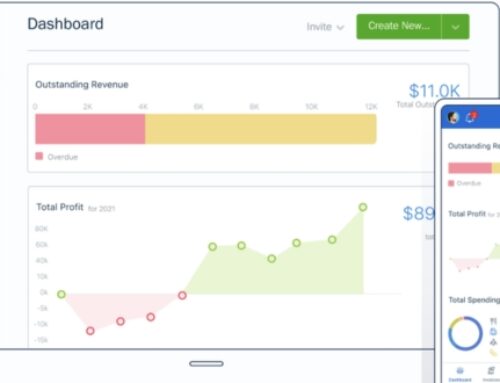Introduction
Financial management is a crucial aspect for the success and sustainability of small businesses. The effective management of finances not only ensures the smooth operation of day-to-day activities but also contributes to long-term growth and profitability. Small businesses face unique challenges, and sound financial practices are essential to navigate through uncertainties and capitalize on opportunities.
Importance of Financial Management for Small Businesses

In the competitive business landscape, small enterprises often operate with limited resources. Efficient financial management becomes paramount as it enables businesses to allocate funds strategically, control costs, and optimize their financial health. Proper financial planning helps small businesses weather economic fluctuations, make informed decisions, and build a solid foundation for expansion. Moreover, it instills confidence in stakeholders, including investors, lenders, and employees, fostering a positive reputation in the market.
Introduction to FreshBooks
One powerful tool that addresses the financial management needs of small businesses is FreshBooks. FreshBooks is a comprehensive cloud-based accounting software designed to simplify and streamline financial processes. From invoicing and expense tracking to time management and reporting, FreshBooks offers a user-friendly platform that empowers small business owners to take control of their finances with ease.
Key Features of FreshBooks

FreshBooks stands out for its intuitive interface and user-friendly features. It provides automated invoicing, allowing businesses to create and send professional-looking invoices effortlessly. The expense tracking feature simplifies the recording of business expenses, helping maintain accurate financial records. Additionally, the time tracking functionality aids in monitoring project hours and facilitating accurate billing.
Advantages of Using FreshBooks
By utilizing FreshBooks, small businesses can save valuable time and resources that would otherwise be spent on manual financial tasks. The software promotes efficiency, reduces the risk of errors, and enhances collaboration among team members. Furthermore, FreshBooks offers insightful reports and analytics, empowering businesses to gain a deeper understanding of their financial performance and make informed decisions for future growth.
Recognizing the importance of financial management is essential for the prosperity of small businesses. Embracing tools like FreshBooks can significantly contribute to the efficiency and effectiveness of financial processes, enabling businesses to focus on what they do best – delivering value to their customers and stakeholders.
Understanding Small Business Financial Management

Financial management for small businesses is a crucial aspect that involves planning, organizing, and controlling the financial activities of an organization to achieve its objectives. It encompasses various processes, tools, and techniques to efficiently utilize financial resources. The scope of financial management for small businesses extends beyond mere bookkeeping and accounting; it involves making strategic decisions that impact the overall financial health of the enterprise.
Definition and Scope of Financial Management
Financial management refers to the efficient planning, organizing, directing, and controlling of financial activities within a small business. This includes managing the acquisition and utilization of funds, assessing risks, and ensuring the financial stability and growth of the organization. The scope encompasses budgeting, financial reporting, cash flow management, investment decisions, and financial analysis. It serves as a guide for business owners to make informed financial decisions that align with their goals and objectives.
Key Principles of Financial Management for Small Businesses
Several key principles guide effective financial management for small businesses. These include:
- Cash Flow Management: Ensuring a positive cash flow is essential for meeting day-to-day operational needs. Effective management involves monitoring inflows and outflows to avoid liquidity crises.
- Budgeting: Developing and adhering to a budget helps allocate resources wisely, set financial goals, and control spending. Regular reviews and adjustments ensure alignment with business objectives.
- Financial Planning: Small businesses need to engage in short-term and long-term financial planning. This involves setting realistic financial goals and creating strategies to achieve them.
- Risk Management: Identifying and mitigating financial risks is crucial. This includes managing market risks, credit risks, and operational risks to safeguard the business’s financial well-being.
- Investment Decisions: Evaluating potential investments and understanding the return on investment (ROI) is vital. This helps allocate resources to initiatives that contribute to the business’s growth and profitability.
Common Challenges Faced by Small Businesses in Managing Finances
Despite the importance of financial management, small businesses often face challenges in this area. Some common challenges include:
- Limited Resources: Small businesses may have limited financial resources, making it challenging to invest in advanced financial systems or hire specialized financial professionals.
- Inadequate Financial Knowledge: Owners and managers of small businesses may lack the financial expertise needed for effective financial management. This can lead to poor decision-making and financial mismanagement.
- Cash Flow Issues: Many small businesses struggle with cash flow problems, including late payments from customers, which can impact their ability to cover operational expenses.
- Risk of Inefficient Record Keeping: Incomplete or inaccurate financial records can hinder decision-making and create compliance issues. Small businesses may lack the systems or personnel to maintain proper financial records.
Understanding and addressing these challenges is essential for small businesses to establish a solid financial foundation and achieve sustainable growth. Regular financial assessments and proactive measures can contribute to improved financial management and overall business success.
The Role of FreshBooks in Small Business Financial Management
In the dynamic landscape of small business financial management, cloud-based accounting software has become an indispensable tool. Among the array of options available, FreshBooks stands out as a reliable and efficient solution. This article delves into the key aspects of FreshBooks and its pivotal role in streamlining financial processes for small businesses.
Overview of FreshBooks as a Cloud-Based Accounting Software
FreshBooks is a leading cloud-based accounting software designed specifically for small businesses and freelancers. Its user-friendly interface and intuitive design make it accessible even for those without extensive accounting backgrounds. By harnessing the power of cloud technology, FreshBooks enables users to access their financial data from anywhere, providing a level of flexibility crucial for businesses on the go.
Key Features and Functionalities
FreshBooks offers a rich set of features tailored to meet the unique needs of small businesses. One notable feature is its invoicing capabilities, allowing users to create professional-looking invoices with ease. The software also supports expense tracking, time tracking, and project management, providing a comprehensive suite of tools for managing various aspects of a small business’s finances. Additionally, FreshBooks facilitates seamless collaboration by allowing multiple users to access and contribute to financial data simultaneously.
Automation is another highlight of FreshBooks, significantly reducing the manual workload for small business owners. From automatic invoice generation to expense categorization, the software streamlines repetitive tasks, allowing entrepreneurs to focus more on business growth and strategy.
Advantages of Using FreshBooks for Small Businesses
The advantages of incorporating FreshBooks into small business financial management are manifold. Firstly, the software enhances efficiency by automating time-consuming tasks, thereby freeing up valuable time for business owners to concentrate on core operations. Secondly, the cloud-based nature of FreshBooks ensures that financial data is securely stored and easily accessible, promoting collaboration and informed decision-making.
Furthermore, FreshBooks contributes to improved financial visibility. Through its reporting and analytics tools, small business owners can gain insights into their financial performance, aiding in strategic planning and budgeting. The ability to accept online payments and the integration with various payment gateways also positions FreshBooks as a convenient solution for businesses looking to enhance their cash flow.
FreshBooks plays a pivotal role in small business financial management by offering a robust and user-friendly platform that combines essential features with the convenience of cloud technology. Its ability to streamline processes, provide insights, and foster collaboration makes it an invaluable tool for entrepreneurs seeking efficient financial solutions tailored to their unique needs.
Getting Started with FreshBooks
Getting Started with FreshBooks can be a seamless and efficient process, designed to simplify your accounting and invoicing needs. The initial steps involve signing up and navigating through the onboarding process. This phase is crucial for establishing your account and tailoring it to your business requirements.
The sign-up process typically involves providing essential information about your business, such as its name, industry, and location. This step is fundamental in customizing the platform to suit the specific needs of your business. FreshBooks may also prompt you to choose a subscription plan that aligns with your budget and accounting requirements.
Once signed up, you’ll proceed with the onboarding process, which aims to guide you through the platform’s key features. This step-by-step orientation helps users familiarize themselves with the interface and understand how to leverage FreshBooks for maximum benefit. During onboarding, you may be prompted to set up your business profile, where you can input crucial details like your logo, business address, and contact information. This enhances the professional appearance of your invoices and communications.
Setting up your business profile is essential for creating a cohesive and branded experience for your clients. FreshBooks allows you to upload your business logo, which will appear on all your invoices and communications. This branding not only adds a professional touch but also reinforces your business identity with clients.
After establishing your business profile, the next critical step is connecting your bank accounts and other integrations. This integration streamlines the financial aspect of your business by automatically syncing transactions and data from your bank accounts into FreshBooks. This automation reduces manual data entry, minimizes errors, and saves you valuable time.
Integrating other tools and apps, such as payment gateways or project management software, enhances the functionality of FreshBooks and provides a more comprehensive solution for your business needs. By connecting these tools, you can ensure a seamless flow of information and data across your various business processes.
The process of getting started with FreshBooks involves a user-friendly sign-up and onboarding process, customization of your business profile for a professional appearance, and the integration of bank accounts and other tools to streamline your financial and operational workflows. This holistic approach sets the foundation for a more efficient and organized accounting experience with FreshBooks.
Managing Invoices and Expenses with FreshBooks
FreshBooks is a comprehensive accounting software that streamlines the process of managing invoices and expenses for businesses. One of its key features is the ability to create and customize invoices efficiently. With FreshBooks, users can easily generate professional-looking invoices tailored to their brand. The platform provides a range of customizable templates, allowing businesses to add their logo, colors, and other branding elements. This not only enhances the professionalism of the invoices but also helps in maintaining a consistent brand identity.
In addition to creating invoices, FreshBooks enables users to track expenses and receipts seamlessly. Businesses can upload receipts directly to the platform, making it convenient to keep all financial records in one place. The expense tracking feature categorizes expenses, providing a clear overview of where the money is being spent. This functionality is crucial for budgeting, financial analysis, and tax preparation, as it allows businesses to monitor and control their expenditures with ease.
One of the standout features of FreshBooks is its capability to automate recurring invoices. For businesses that have regular billing cycles, such as monthly subscriptions or service retainers, this automation can save a significant amount of time and effort. Users can set up recurring invoices with specific intervals, and FreshBooks will automatically generate and send them on the scheduled dates. This not only reduces the administrative burden but also ensures that invoicing is consistent and timely, improving cash flow and client relationships.
FreshBooks offers a robust solution for managing invoices and expenses. Its user-friendly interface, customization options, and automation features make it a valuable tool for businesses seeking efficiency and organization in their financial processes. Whether creating invoices, tracking expenses, or automating recurring billing, FreshBooks provides a comprehensive and intuitive platform for businesses to stay on top of their financial management tasks.
Time Tracking and Project Management
Time Tracking and Project Management are crucial aspects of business operations, playing a pivotal role in ensuring efficiency, productivity, and financial success. One effective tool for these purposes is FreshBooks, a comprehensive platform that offers a range of features to streamline various aspects of business management.
FreshBooks excels in Time Tracking by providing a user-friendly interface that allows individuals and teams to record and monitor the time spent on specific tasks or projects. This functionality is essential for businesses that bill clients based on the hours worked. With FreshBooks, users can easily log their working hours, allocate time to specific projects, and maintain accurate records of their activities. This not only enhances transparency but also facilitates precise invoicing.
Managing projects and tasks is another strength of FreshBooks. The platform allows users to break down projects into smaller, manageable tasks, assign them to team members, and set deadlines. This level of organization ensures that everyone involved in a project is on the same page, contributing to improved collaboration and project completion within stipulated timelines. The ability to track project progress and monitor task status further enhances project management capabilities.
One of the key features that sets FreshBooks apart is its invoicing based on billable hours. For businesses that charge clients by the hour, this feature simplifies the invoicing process and ensures accuracy. FreshBooks can automatically generate invoices based on the recorded billable hours, reducing the manual effort required for invoicing. Additionally, the platform provides customizable invoice templates, allowing businesses to maintain a professional appearance and include relevant details such as project milestones, task descriptions, and hourly rates.
FreshBooks serves as a comprehensive solution for businesses seeking effective Time Tracking and Project Management. Its intuitive interface, robust features for managing tasks and projects, and the ability to generate accurate invoices based on billable hours make it a valuable asset for businesses of all sizes. By leveraging FreshBooks, organizations can enhance their operational efficiency, maintain accurate financial records, and ultimately contribute to the overall success of their projects and client relationships.
Benefits of FreshBooks for Small Businesses:
Improved Cash Flow Management:
Effective cash flow management is a cornerstone for the survival and growth of small businesses. FreshBooks addresses this crucial aspect by offering tools that enable businesses to monitor their cash flow in real-time. By utilizing features such as automated invoicing and online payments, FreshBooks helps businesses expedite the payment cycle. This not only facilitates faster revenue generation but also assists in identifying potential cash flow issues promptly. Small businesses can take proactive measures to address these issues, ensuring a healthy and sustained cash flow for their operations.
Time Savings and Increased Efficiency:
Time is a precious commodity for small business owners who often find themselves juggling multiple responsibilities. FreshBooks recognizes this challenge and contributes to time savings by automating repetitive tasks such as invoicing and expense tracking. The platform’s automation features allow entrepreneurs to redirect their valuable time towards core business activities. By streamlining these processes, FreshBooks enhances overall efficiency, contributing to increased productivity and, consequently, the success of the business.
Enhanced Financial Reporting and Analysis:
Access to accurate and up-to-date financial reports is paramount for making informed business decisions. FreshBooks addresses this need by providing a variety of customizable reports, including profit and loss statements, balance sheets, and expense reports. These reports offer valuable insights into the financial performance of the business. Small businesses can leverage this information for strategic planning and decision-making, enabling them to adapt their approach based on a clear understanding of their financial situation.
Scalability and Flexibility:
One of the strengths of FreshBooks is its ability to scale alongside businesses. Whether a business is a solopreneurship or a rapidly growing enterprise, FreshBooks is designed to adapt to evolving needs. This scalability ensures that businesses can continue to rely on FreshBooks as they expand, facing new financial challenges along the way. The platform’s flexibility accommodates the diverse requirements of businesses at different stages of their development, making it a reliable and long-term financial management solution.
Compliance and Tax Preparation:
Navigating tax regulations is a constant concern for small businesses. FreshBooks addresses this challenge by simplifying the tax preparation process. The platform organizes financial data systematically, providing businesses with essential reports for tax compliance. By maintaining accurate and well-organized financial records, FreshBooks helps streamline the tax filing process. This not only saves time but also minimizes the risk of errors, ensuring that small businesses can fulfill their tax obligations efficiently and with confidence.
Conclusion:
In conclusion, FreshBooks stands as a formidable ally for small businesses seeking to master financial management. From its user-friendly interface to robust features like invoicing, expense tracking, and project management, FreshBooks addresses the diverse needs of small businesses. By understanding the benefits, potential challenges, and tips for maximizing FreshBooks, businesses can make informed decisions that propel them toward financial success in an ever-evolving market. As technology continues to advance, embracing tools like FreshBooks becomes not just a choice but a strategic imperative for small businesses aiming to thrive in the modern business landscape.








